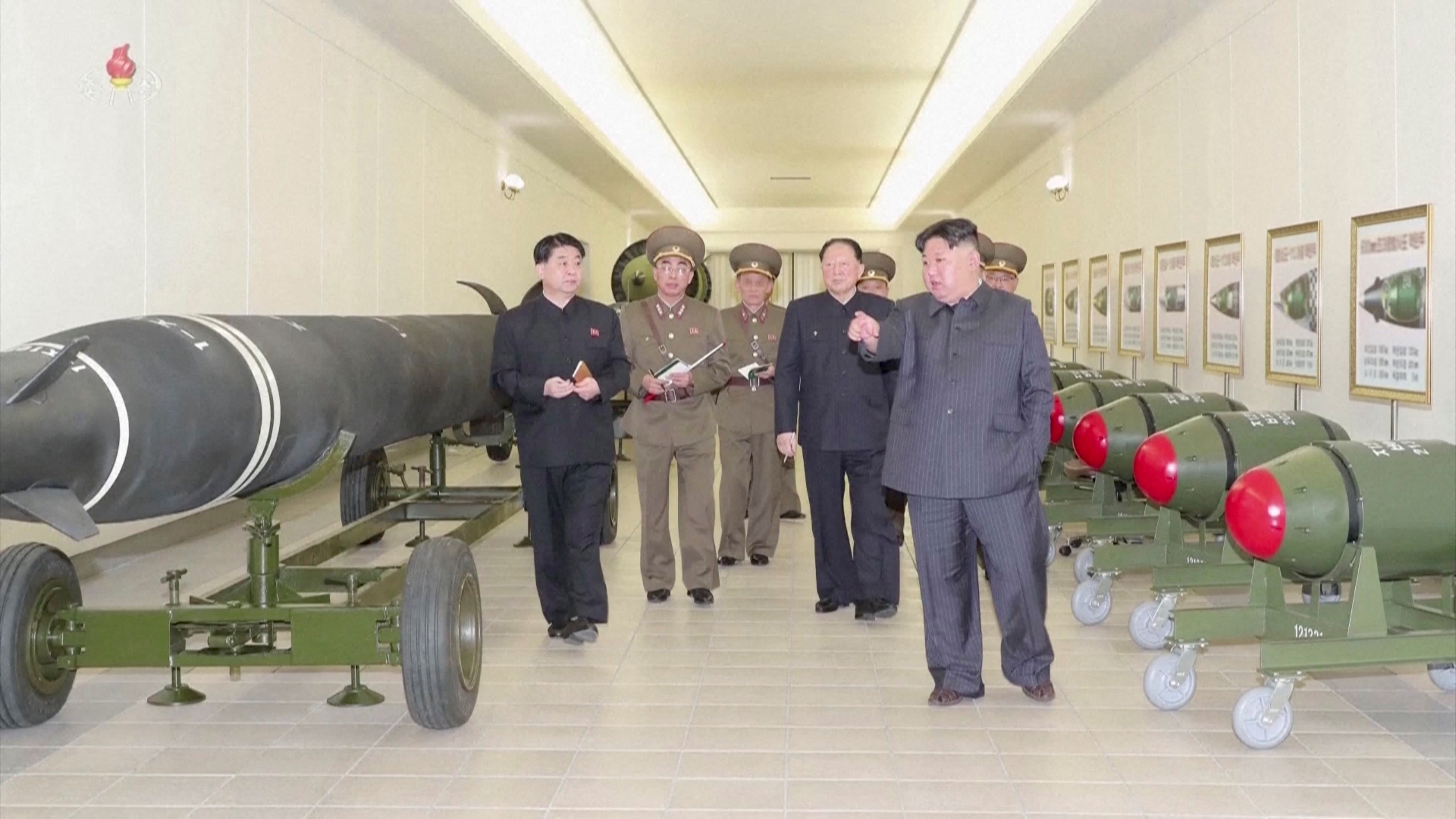
[elfsight_social_share_buttons id=”1″]
The United States has seen no willingness by North Korea to accept a U.S. offer to hold talks on its nuclear weapons program but the offer still stands, White House national security spokesperson John Kirby told reporters on Tuesday.
“To date, they have not shown any willingness,” Kirby said.
North Korea unveiled new, smaller nuclear warheads and vowed to produce more weapons-grade nuclear material to expand the country’s arsenal, state media KCNA said on Tuesday, as a U.S. aircraft carrier arrived in South Korea for military drills.
KCNA released photos of the warheads, dubbed Hwasan-31s, as leader Kim Jong Un visited the Nuclear Weapons Institute, where he inspected new tactical nuclear weapons and technology for mounting warheads on ballistic missiles, as well as nuclear counterattack operation plans.
Experts say the images could indicate progress in miniaturizing warheads that are powerful yet small enough to mount on intercontinental ballistic missiles capable of striking the U.S.
“It has something more powerful in a smaller space. That’s worrisome,” said Kune Y. Suh, professor emeritus of nuclear engineering at Seoul National University, comparing the new warheads to the 2016 version.
Kim Dong-yup, a former South Korean naval officer who teaches at Kyungnam University, said the warheads were most likely designed for use with at least eight different delivery platforms listed in posters on the wall, including missiles and submarines.
“Those are not limited to tactical missiles but appear to be a miniaturized, lightweight, and standardized warhead that can mount on various vehicles,” he said.
“Now that the delivery vehicles are nearly ready, they would churn out warheads to secure second-strike capabilities – perhaps hundreds, not dozens – while running centrifuges even harder to get weapons-grade nuclear material,” he added
Kim Jong Un ordered the production of weapons-grade materials in a “far-sighted way” to boost its nuclear arsenal “exponentially” and produce powerful weapons, KCNA said.
He said the enemy of the country’s nuclear forces is not a specific state or group but “war and nuclear disaster themselves,” and the policy of expanding the arsenal is solely aimed at defending the country, and regional peace and stability.
Kim was also briefed on an IT-based integrated nuclear weapon management system called Haekbangashoe, which means “nuclear trigger”, whose accuracy, reliability, and security were verified during recent drills simulating a nuclear counterattack, KCNA said.
North Korea has been ramping up tensions, firing short-range ballistic missiles on Monday and conducting a nuclear counterattack simulation last week against the U.S. and South Korea, which it accused of rehearsing an invasion with their military exercises.
North Korea‘s military simulated a nuclear airburst with two tactical ballistic missiles equipped with mock warheads during Monday’s training, while testing a nuclear-capable underwater attack drone again on March 25-27, KCNA said in separate dispatches.
The underwater drone, called Haeil-1, reached a target in the waters off the northeast coast after cruising along a “jagged and oval” 373-mile course for more than 41 hours, it said.
South Korean President Yoon Suk Yeol said North Korea does not deserve “a single penny” of economic aid while pushing for nuclear development, his spokesman said.
A South Korean military spokesman said that additional tests and analysis would be needed to verify whether the North‘s new warheads are deployable, but that its report on the underwater drone was most likely “exaggerated and fabricated.”
US AIR CARRIER
Also on Tuesday, a U.S. carrier strike group led by the USS Nimitz docked at the Busan naval base in South Korea after conducting joint maritime drills. It was the carrier’s first visit in nearly six years and coincides with the 70th anniversary of the two countries’ alliance.
Rear Admiral Kim Ji-hoon of the South Korean navy said joint exercises were intended to improve U.S. extended deterrence – the military capability, especially nuclear forces, to deter attacks on its allies – given the North‘s evolving threats.
The strike group commander, Rear Admiral Christopher Sweeney, said his ships were prepared for any contingency.
“We don’t seek conflicts with the DPRK. We seek peace and security. We’re not going to be coerced, we’re not going to be bullied and we’re not going anywhere,” he told reporters.
DPRK is an abbreviation for North Korea‘s official name, the Democratic People’s Republic of Korea.
Pyongyang has accused the allies of stoking tensions and using exercises to rehearse an invasion.
A commentary in the Rodong Sinmun, the North‘s ruling party media outlet, said the drills, especially those involving the aircraft carrier, amount to “an open declaration of war” and preparations for a “preemptive attack” against North Korea.
“The frantic war drills in the puppet region are not just military drills but nuclear war drills for a preemptive strike … pursuant to the U.S. political and military option to escalate confrontation with the DPRK and finally lead to a war,” it said.
Copyright 2023 Thomson/Reuters
